Non-Invasive Testing With Jordan Mayberry
Chat with MASLD AI

Hi, I am MASLD AI.
Suggested Questions :

MASLD AI 07:47 PM

In this educational session, Jordan Mayberry, PA-C from UT Southwestern, presents a practical overview of non-invasive testing for diagnosing and staging metabolic dysfunction-associated steatotic liver disease (MASLD) and metabolic-associated steatohepatitis (MASH). Using a real-world patient case, Jordan discusses how clinicians can leverage key tools—such as FIB-4, ELF testing, FibroScan (VCTE), and MRI elastography—to assess fibrosis and stratify risk in patients with MASLD. She explains the benefits, limitations, and clinical applications of each modality, including guidance on when and how to use them in everyday practice. Whether you're a hepatology specialist or a provider managing patients with cardiometabolic risk factors, this talk delivers a clear, step-by-step approach to incorporating non-invasive liver assessment into your workflow. Viewers are also invited to explore the GHAPP MASLD/MASH Community Network for ongoing education, resources, and clinical insights.
Related Webcast
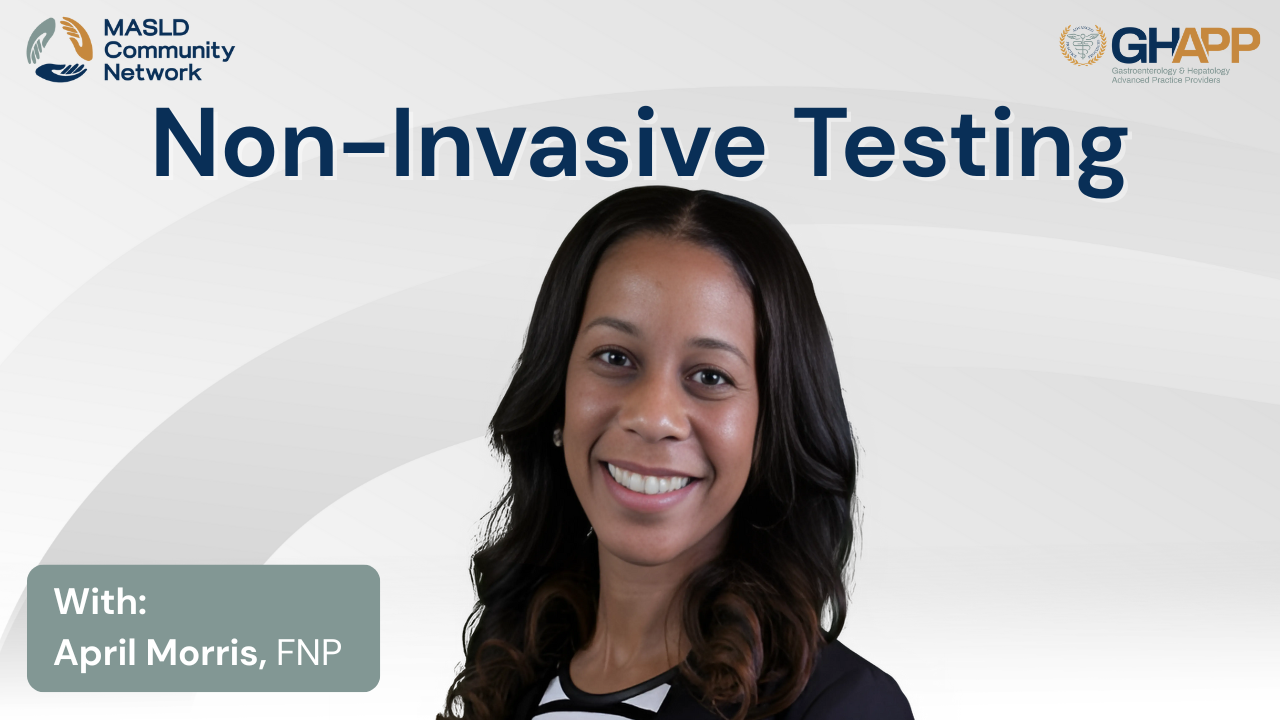
Non-Invasive Testing With April Morris

In this educational presentation, April Morris, FNP—an experienced provider in both liver disease and endocrinology—guides viewers through the evolving landscape of non-invasive testing (NITs) for diagnosing and managing patients with MASLD (Metabolic Dysfunction-Associated Steatotic Liver Disease) and MASH. Using the case of a 65-year-old male with metabolic co-morbidities and suspected liver disease, Morris reviews how to effectively apply tools like the FIB-4 score, ELF test, and FibroScan (VCTE) to assess fibrosis risk and stratify patients. She compares imaging modalities including transient elastography, MR elastography (MRE), and shear wave elastography, offering practical considerations such as patient eligibility, test accuracy, and insurance barriers. The discussion emphasizes the importance of interpreting NITs within clinical context—highlighting how to determine risk, guide patient counseling, and establish a follow-up plan for low-risk patients. This session also reinforces the role of primary care in longitudinal liver health management and directs providers to resources available through the GHAPP MASLD & MASH Community Network.
Watch Now

Lifestyle Management With Anthony Derencius

Join Anthony Derencius, PA-C, at Pinnacle Clinical Research, for an in-depth, case-based discussion on the role of lifestyle management in MASH and MASLD. In this educational session from the GHAPP MASLD Community Network, Anthony walks through the real-world case of a 65-year-old patient with obesity, diabetes, and suspected metabolic liver disease, highlighting how to interpret non-invasive diagnostics like FIB-4 scores and transient elastography. He explains the clinical significance of metabolic risk factors, genetic predispositions (such as PNPLA3), and how personalized approaches to nutrition and exercise can alter the progression of fatty liver disease. With evidence-based insights on the Mediterranean diet, aerobic vs resistance training, and behavior change strategies, this video offers frontline strategies to support patients in reversing or slowing fibrosis. Watch to learn how providers can combine patient education, lifestyle interventions, and emerging pharmacotherapy to manage MASLD and MASH more effectively. Educational support provided by Madrigal Pharmaceuticals. For more disease state content, visit the GHAPP MASLD Community Network.
Watch Now
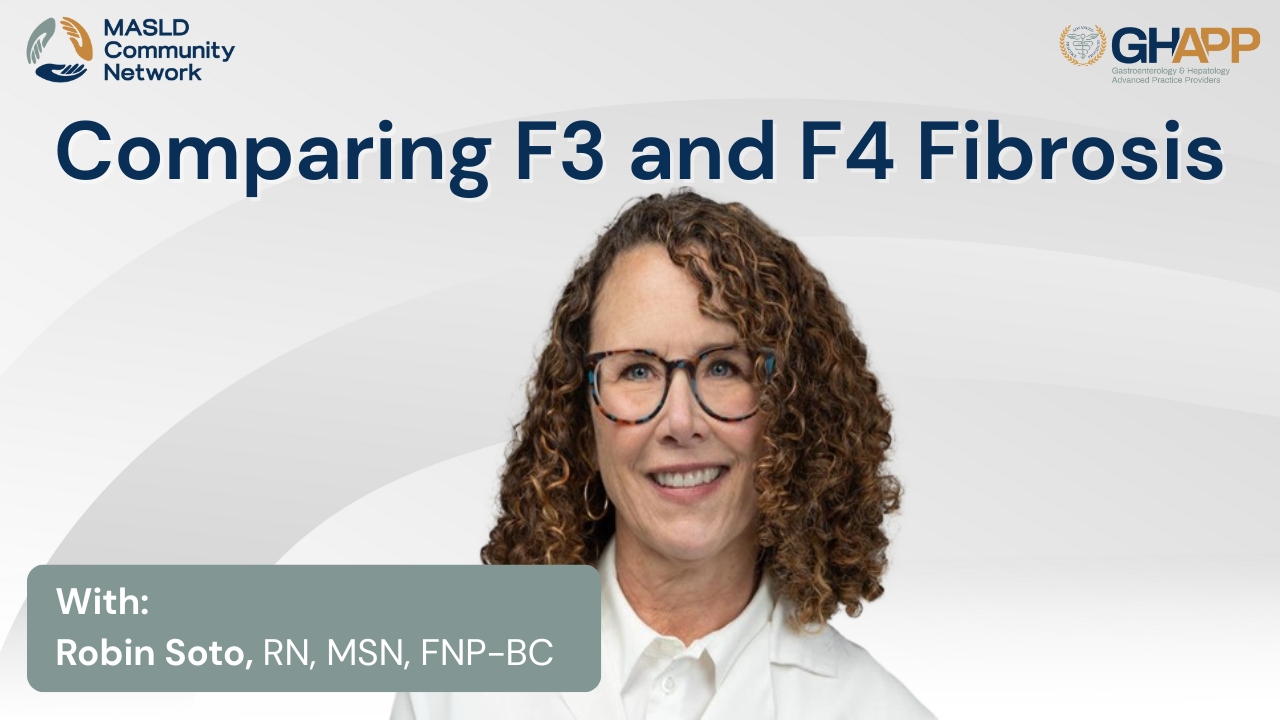
Comparing F3 and F4 Fibrosis With Robin Soto

In this in-depth case-based session from the GHAPP MASLD/MASH Community Network, Robin Soto, NP from UC San Diego Health, explores the clinical nuances of diagnosing and managing fibrosis stage 3 versus stage 4 in patients with MASH (Metabolic Dysfunction–Associated Steatohepatitis). Using a real-world case study of a patient named Sam, Robin demonstrates how to interpret and reconcile non-invasive tests (NITs) like FIB-4, FibroScan, CAP score, and ELF test to guide accurate staging. She offers practical insights into treatment decisions, including when to use resmetirom, the importance of lifestyle modification, and how to assess comorbidities like diabetes, obesity, and cardiovascular risk. The session also outlines when and how to monitor for hepatocellular carcinoma (HCC), implement liver cancer surveillance strategies, and approach multidisciplinary care for advanced fibrosis or cirrhosis. Whether you’re a hepatology specialist or a primary care provider, this video equips you with evidence-based tools for managing MASLD and optimizing outcomes in complex liver disease.
Watch Now
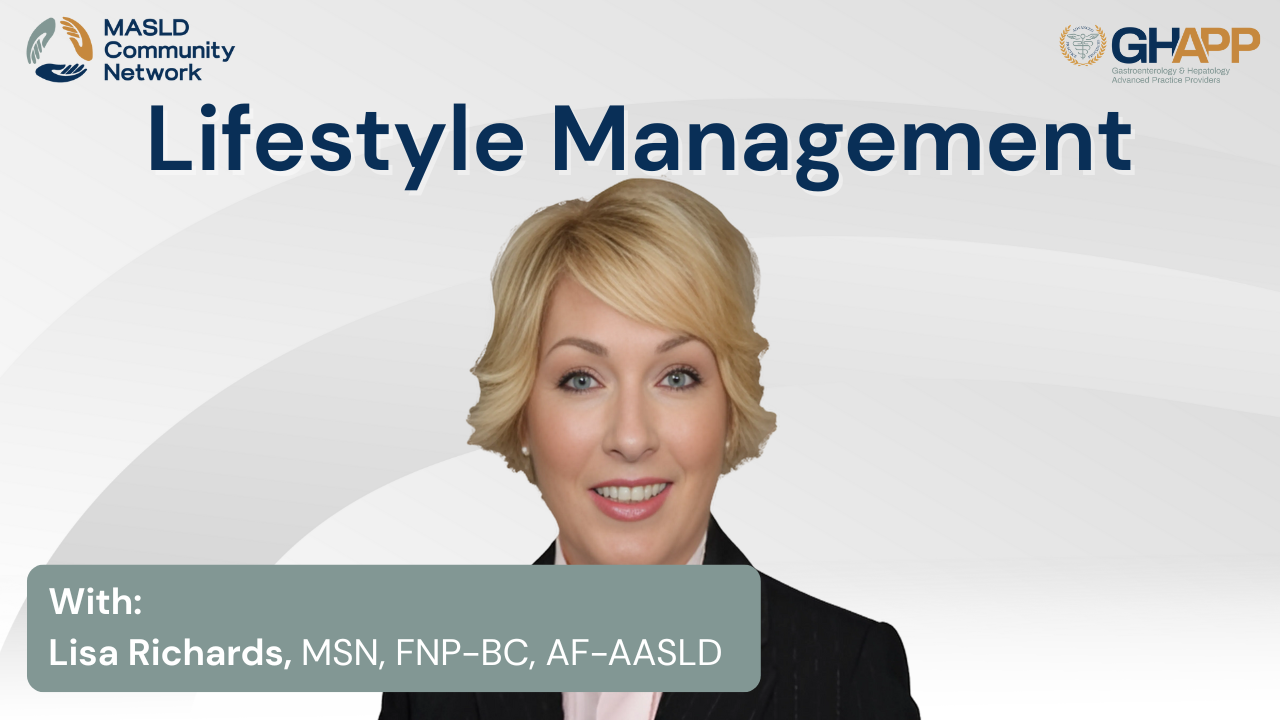
Lifestyle Management With Lisa Richards

Join Lisa Richards, FNP-BC, from UC San Diego Health, as she leads a powerful educational session on the lifestyle management of MASLD (Metabolic Dysfunction–Associated Steatotic Liver Disease) in this GHAPP MASLD/MASH Community Network event, sponsored by Madrigal Pharmaceuticals. Through a compelling clinical case study, Lisa walks viewers through a step-by-step approach to diagnosing MASLD, assessing fibrosis risk using noninvasive tools like FIB-4 and FibroScan, and implementing guideline-based interventions. Learn how to counsel patients on culturally sensitive dietary modifications, physical activity strategies, and behavior change techniques that improve outcomes. This session also explores the clinical relevance of weight loss thresholds, Mediterranean-style eating plans, and the importance of patient-centered goal setting. Whether you’re a provider managing metabolic liver disease or looking to integrate newer therapies like resmetirom, this video offers practical tools to empower sustainable change and improve liver health.
Watch Now
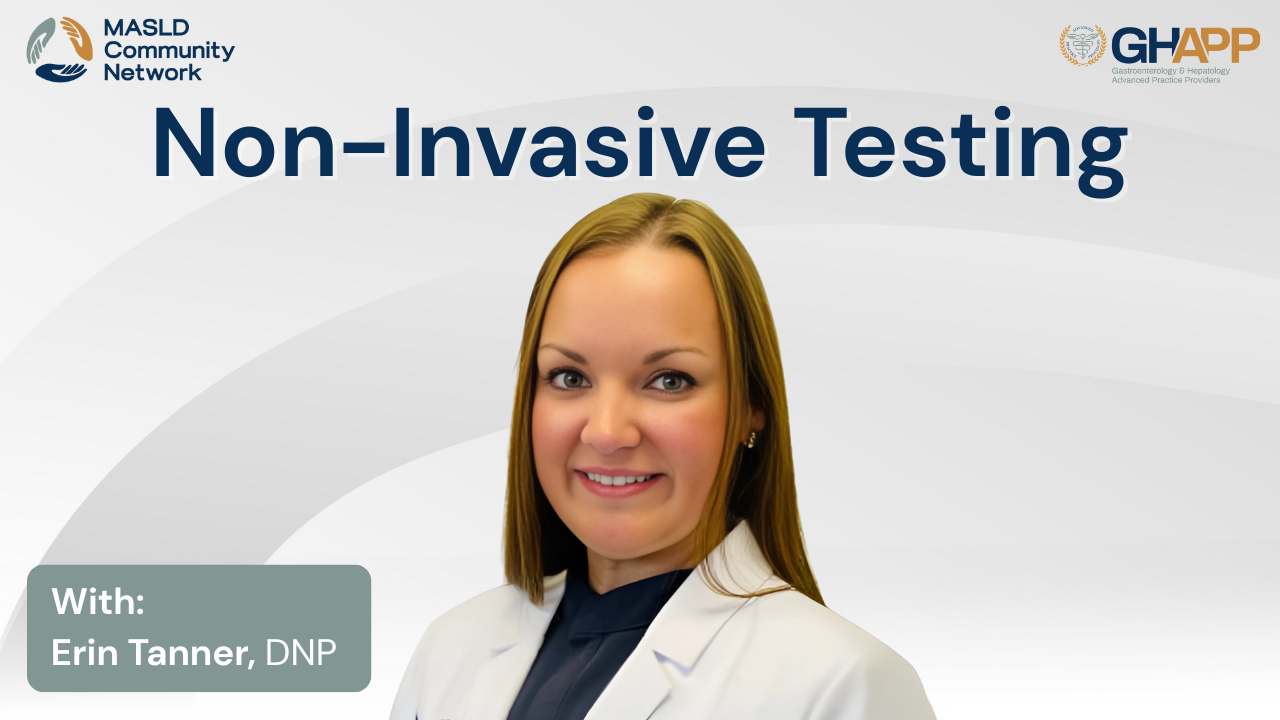
Non-Invasive Testing With Erin Tanner

In this educational session from the GHAPP MASLD & MASH Community Network, Erin Tanner, PA-C from Gastro Health in Birmingham, Alabama, presents a practical overview of non-invasive testing (NIT) options for evaluating and managing MASLD (Metabolic dysfunction-associated steatotic liver disease) and MASH (Metabolic dysfunction-associated steatohepatitis). Using a patient case study, Erin explores how clinicians can effectively utilize tools like FIB-4, FibroScan® (VCTE and CAP), ELF, MRE, and other emerging imaging and serum biomarkers to assess hepatic steatosis and fibrosis without the need for liver biopsy. The talk breaks down the pros, cons, and clinical accuracy of various NITs—including shear wave elastography, MRI-PDFF, and proprietary serum markers—and offers guidance on how to apply these tools in real-world hepatology and primary care settings. Special attention is given to identifying patients with metabolic risk factors, interpreting indeterminate FIB-4 scores, and knowing when to refer patients for further hepatology evaluation. Whether you’re new to liver disease management or looking to update your MASLD/MASH care pathways, this session offers clarity on how to stratify fibrosis risk and make informed clinical decisions using non-invasive diagnostics.
Watch Now
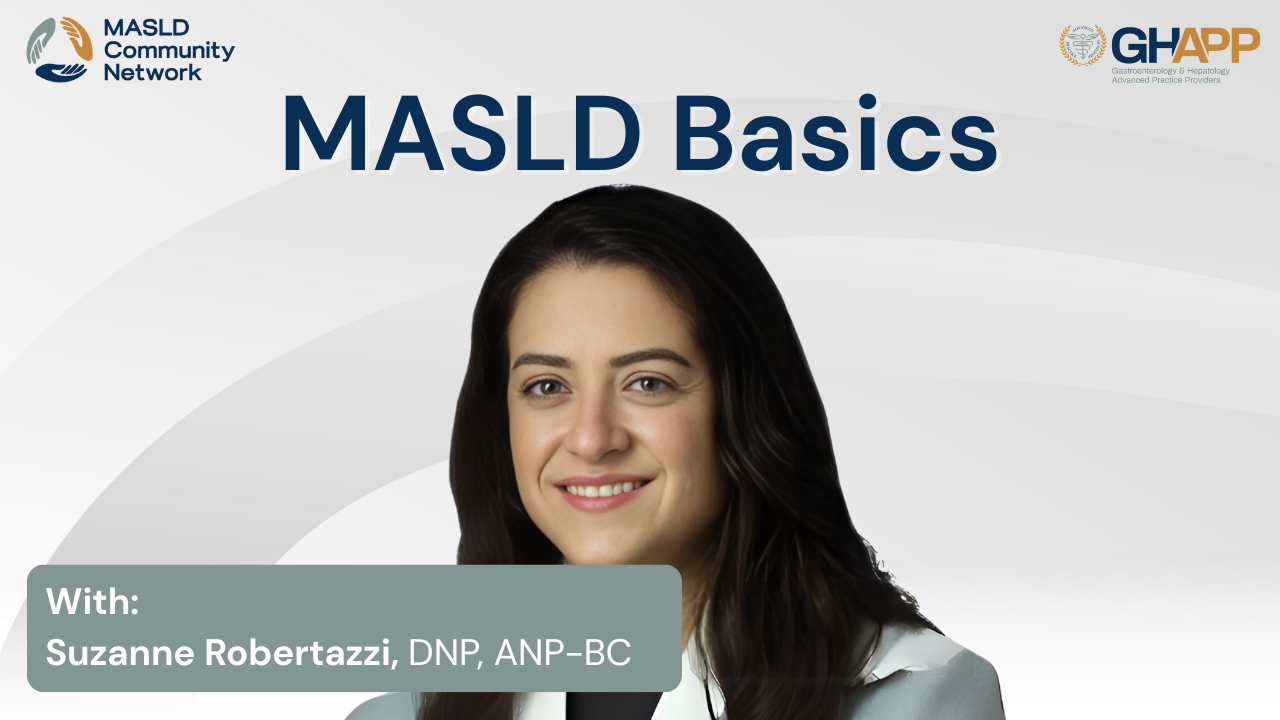
MASLD Basics With Suzanne Robertazzi

Join Suzanne, a nurse practitioner from the Washington DC VA Medical Center, as she kicks off a comprehensive lecture series on steatotic liver disease, focusing on the evolving understanding of MASLD (Metabolic dysfunction-associated steatotic liver disease) and MASH (Metabolic dysfunction-associated steatohepatitis). In this foundational session, Suzanne walks through the new nomenclature replacing NAFLD and NASH, and outlines the clinical criteria used to identify and stratify patients along the MASLD–MASH spectrum. Learn how metabolic risk factors such as obesity, prediabetes, hypertension, and dyslipidemia contribute to disease progression, and explore the use of non-invasive diagnostic tools like Fib-4, FibroScan, and ELF scores to assess fibrosis. The session also discusses indications for liver biopsy, the implications of overlapping etiologies (like alcohol-associated liver disease), and strategies for identifying patients at high risk for cirrhosis, hepatocellular carcinoma (HCC), and liver-related mortality. This lecture equips clinicians, particularly those in primary care and hepatology, with a practical framework to evaluate steatosis, interpret metabolic profiles, and determine when to refer patients for specialty care. Whether you're new to liver disease or looking for updates on MASLD and MASH terminology, this session is an essential starting point.
Watch Now

Lifestyle Management With Robin Soto

Join Robin Soto, NP from UC San Diego Health, for a practical and case-based discussion on lifestyle management in patients with MASLD and MASH (Metabolic dysfunction-associated steatotic liver disease and steatohepatitis). In this presentation, Robin walks through the diagnosis and management of a representative patient case, highlighting how to assess fibrosis risk using non-invasive tools like FIB-4 and FibroScan, and emphasizing the critical role of lifestyle intervention. Learn how diet, exercise, and behavioral counseling can slow or reverse liver disease progression—especially in patients with cardiometabolic risk factors such as type 2 diabetes, obesity, and hyperlipidemia. Robin also addresses real-world barriers to dietary change, including cultural preferences, food accessibility, and socioeconomic challenges, while offering practical strategies for behavior change and patient engagement. This session is part of the GHAPP MASLD/MASH Community Network and includes educational resources on MASH and promotional information about Rezdiffra, a new treatment option for patients with advanced disease. Whether you're a hepatology provider or managing liver disease in primary care, this presentation offers essential, real-world guidance to support your clinical decision-making.
Watch Now

Lifestyle Management With Whitney Steinmetz

In this case-based clinical discussion, Whitney Steinmetz, FNP from Presbyterian Medical Group in Albuquerque, New Mexico, offers an in-depth review of lifestyle management strategies for patients with MASLD and MASH. Using the case of a 65-year-old male with persistently elevated ALT and metabolic syndrome, she highlights the importance of individualized, culturally competent counseling around nutrition, exercise, and behavioral change. Steinmetz outlines how tools like the FIB-4 score and FibroScan can help guide management and determine fibrosis risk, while emphasizing the critical role gastroenterology providers must play in addressing obesity, insulin resistance, and dietary habits. From the utility of motivational interviewing and realistic meal planning to the integration of caloric restriction and personalized exercise, this presentation equips clinicians with practical tools to support sustainable behavior change in patients with metabolic liver disease. Genetic factors, social determinants of health, and patient empowerment are all addressed, offering a holistic perspective on disease progression and prevention.
Watch Now
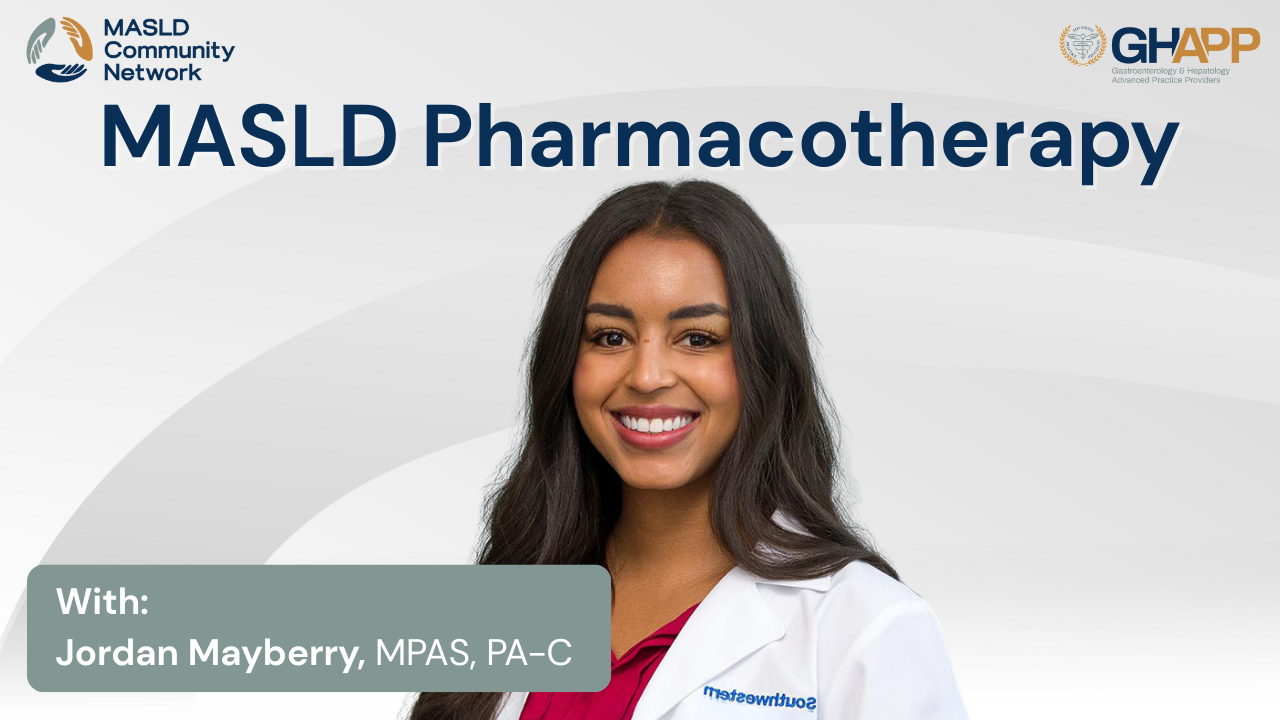
MASLD Pharmacotherapy With Jordan Mayberry

Join Jordan Mayberry, MPAS, PA-C from UT Southwestern, for an insightful session from the GHAPP MASLD/MASH Community Network focused on the evolving landscape of pharmacotherapy in MASLD and MASH. This presentation explores evidence-based strategies for treating metabolic dysfunction–associated steatotic liver disease (MASLD), with an emphasis on weight loss, diabetes management, and liver-directed therapies. Jordan breaks down key data on GLP-1 receptor agonists, SGLT2 inhibitors, Vitamin E, pioglitazone, and highlights the latest clinical evidence supporting the use of Resmetirom—the first FDA-approved treatment for MASH with stage 2 or 3 fibrosis. Learn how these therapies fit into hepatology practice, including clinical considerations, side effect management, and patient selection. Stay up to date on ongoing research, treatment duration, and real-world application of these new therapies. Don’t forget to register and join the GHAPP MASLD/MASH Community Network for continued education and access to valuable resources.
Watch Now
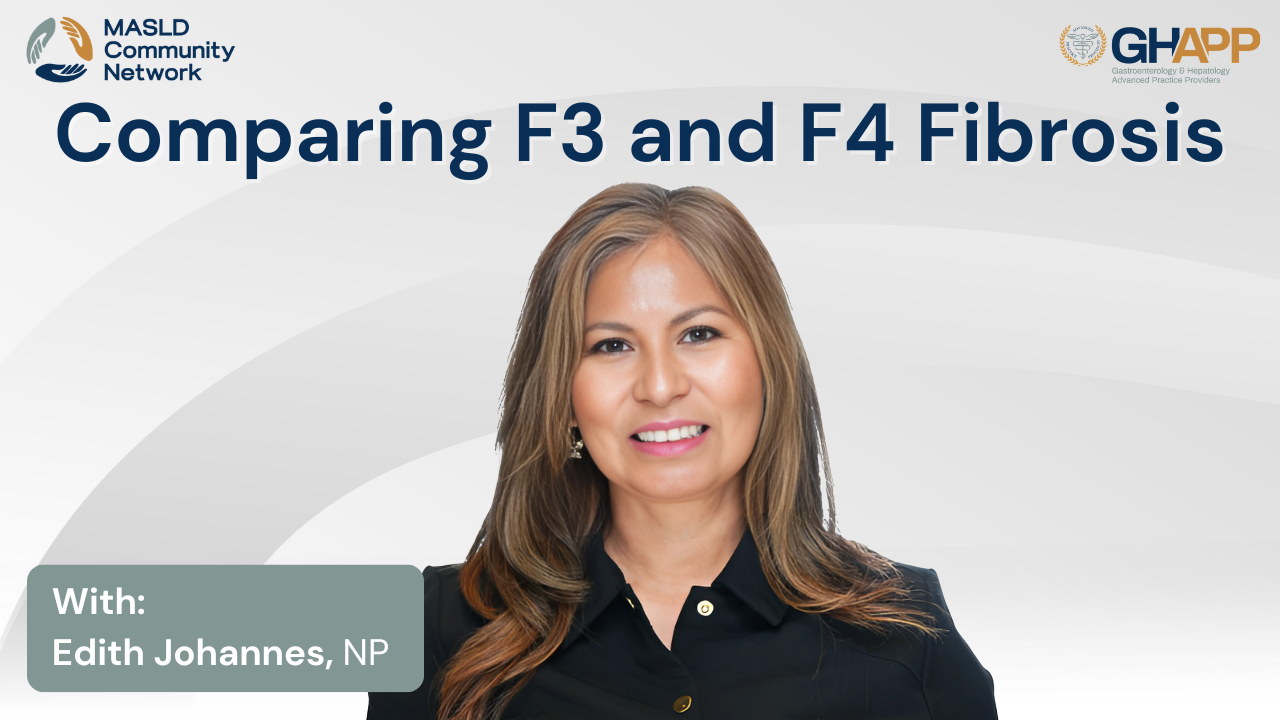
Comparing F3 and F4 Fibrosis With Edith Johannes

Join Edith Johannes, NP from UCLA Health, for a comprehensive and approachable introduction to MASLD (Metabolic Dysfunction-Associated Steatotic Liver Disease)—formerly known as NAFLD—and how to accurately diagnose it. Designed for primary care providers and early learners in hepatology, this session outlines the fundamental criteria for diagnosing MASLD and MASH, the importance of ruling out alternate causes of hepatic steatosis, and the key role of cardio-metabolic risk factors. Edith discusses how to apply non-invasive testing tools such as the FIB-4 score, ELF test, and elastography to determine fibrosis stage, along with guidance on when to consider liver biopsy and refer to hepatology. The presentation also explores the overlap between MASLD and alcohol-related liver disease, addresses the impact of genetic risk factors like PNPLA3 (particularly in Hispanic populations), and reinforces the urgent need for early detection to prevent cirrhosis and liver cancer. With clinical pearls and case-based examples, this session helps clinicians feel confident in evaluating patients for MASLD and navigating next steps for care.
Watch Now





 July 2025
July 2025 